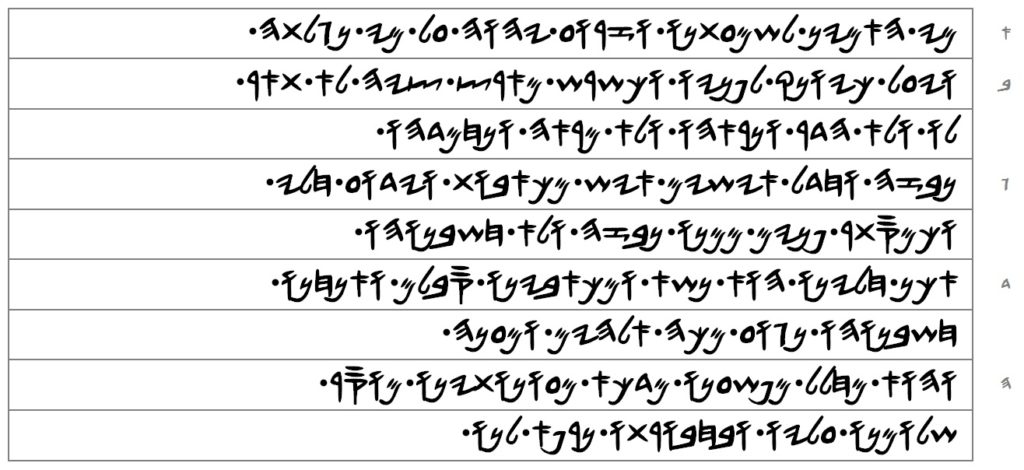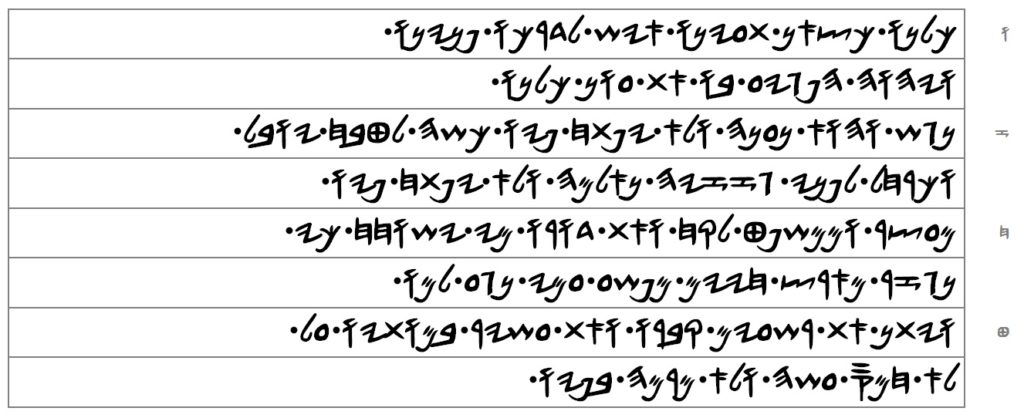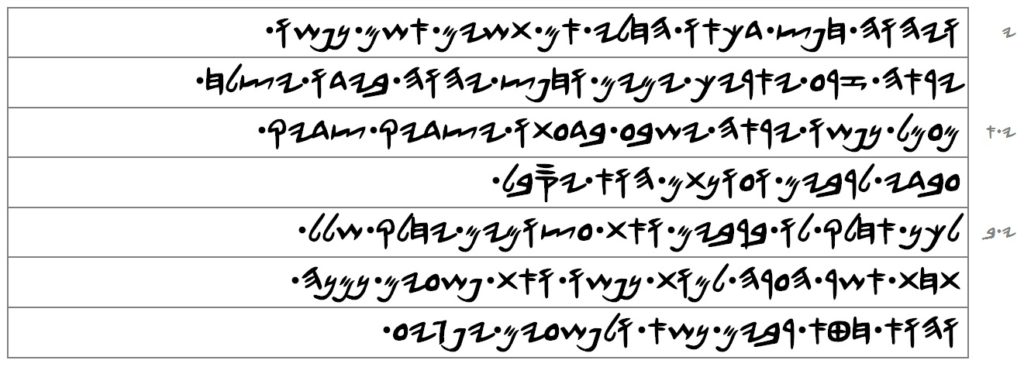

[1] may ha’amayn la-shamaith-no wa-zaro’ai YA’OH ghal may nagalathah
Who has caused to be believed our report? And the arm of YA’OH, upon who has it been revealed?
[2] wA-yail cha-yonak lapanay-o wa-cha-sharash ma-arats tsayh la tha’ar lo wa-la hadar wa-nara-ho wa-la marah wa-nakhamada-ho
And it grew up like a suckling infant before Him, and like a root from the dry land. No form is to it and no beauty, and we saw it, and no appearance that we would desire it.
[3] nabazah wa-khadal ayshaym aysh machaboth wa-yadoai khalay wa-cha-masathar panaym mamano nabazah wa-la khashabno-ho
It is despised and rejected of men, one of sorrows, and it knows anxiety, and like the one who hides the face from it, it is despised, and we did not consider it.
[4] achan khalayno ho’ nash’ wa-machabayno sabalam wa-anakhno khashabno-ho nagoai machah ala’aym wa-ma-ghanah
Surely it has borne up our anxiety, and our sorrows it has carried them, and we considered it a stricken one, beaten by Alah’aym, and from affliction.
[5] wa-ho’ makhalal ma-pashaino madach’ ma-ghonothayno mosar shalomno ghalay-o wa-ba-khaboratho narap’ lano
And it is one wounded from our transgressions, it is one bruised from our punishments. The correction of our shalom is upon it, and by it’s stripes were we healed.
COMMENTARY OF YASHAI-YA’OH 53:1-5
[Verse 1] Christianity wants this chapter to be about its idol god Jesus Christ. That’s not possible when you look at the details from the source language and put away heathen translations. Right off the bat, the phrase zaro’ai YA’OH/זרוע יהוה (the arm of YA’OH) lets us know immediately what the prophet Yashai-Ya’oh (aka Isaiah) is talking about in this chapter. He is talking about a group of righteous people who remain loyal to YA’OH. Yashai-Ya’oh has already spoken about them, this zaroai YA’OH, in the 51st chapter and verse 9.
The two interrogative questions may/מי (who?) in verse 1 show that a report about the zaroai YA’OH will go forth from us, meaning from Yashai-Ya’oh and the other prophets, but it will be something many will not believe in. Nor will the majority of people even become aware of the zaro’ai YA’OH because the zaro’ai YA’OH will not be revealed unto them until its too late. How then can the zaro’ai YA’OH be mistaken for Jesus Christ of the Christian religion when there are millions upon millions of people calling upon that name and who place their faith in that god? That is not a report that has been revealed to only a few!
[Verse 2] The word yonakh/יונק (suckling infant) does not mean “tender plant” as rendered in the 1611 Queen James Virus translation. The noun is derived from the verb yanak/ינק (to suckle). The zaro’ai YA’OH begins like a child that is still breast feeding. A suckling infant is totally dependent upon its mother. The root from the dry ground is another image of vulnerability and helplessness. Without water the root will dry up and die. The zaro’ai YA’OH has no form or beauty at this stage of its growth and development. The masses are not being drawn to it because its outward appearance is not appealing to the eye. This is not something you would say about a grown adult male. These words describe a community of people, and the community is being described in its infancy stage as unattractive.
[Verse 3] The zaro’ai YA’OH is despised and rejected by men while it is still young. It is aysh machaboth/איש מכאבות (one of sorrows). The 1611 Queen James Virus renders the word aysh in this verse as “man,” but the zaro’ai YA’OH is not a man. The zaro’ai YA’OH is a group of people, and these people know all about sorrows due to their history. Because the zaro’ai YA’OH has the stigma of being oppressed and afflicted, not everyone will wish to be associated with it. Most will hide their faces from it. They despise it and do not give it consideration. We are still talking about a group of people on the rise, but in the early stages of their rise they are despised and rejected by the masses. Neither the fictional Jesus Christ of the satanic Greek New Testament, nor the righteous historical figure behind the distorted myth, was ever despised and rejected by the masses in the early stages of his ministry. On the contrary, people pushed their way through huge crowds in order to get a glimpse of him, and to hear him speak.
[Verse 4] Surely it has borne up our anxiety, and our sorrows it has carried them. The zaro’ai YA’OH catches hell because of the larger group of people it belongs to. It suffers because it cannot get from under the labels that the oppressor has given to the people who the zaro’ai YA’OH comes from. This is the guilt by association fallacy. It is a logical fallacy because it views people negatively, in this case the zaro’ai YA’OH, because of their association with a people who are already viewed negatively, i.e. so-called black people. In other words, the zaro’ai YA’OH can’t be a holy people because they are black people, and black people are mostly thugs and criminals, right? The only things black people are good at are rap music and basketball, right? This is why the zaro’ai YA’OH doesn’t get a break in its early beginnings. It is already considered as stricken and beaten by Alah’aym which means doomed to failure.
[Verse 5] The Christian interpretation of verse 5, i.e. a savior god is beaten to death in order save his people from their sin, is satanic. And it is wounded from our transgressions. This clause just means the zaro’ai YA’OH is limping out of the gate because the people it comes from have handicapped it. There is no hint of wounding in order to atone for transgressions here. The zaro’ai YA’OH is wounded “from” its people’s transgressions, not on behalf of their transgressions. The nation of Ya’oh-shar-al and all of its tribes inflicted the wound by being sinful and this is what put the zaro’ai YA’OH in the deficit column before it even gets started.


The correction of our shalom is upon it, and by it’s stripes were we healed, meaning the zaro’ai YA’OH is the nation of Ya’oh-shar-al’s only hope to be healed. If you do not find at least a few good grapes in a bowl full of rotten grapes you are going to throw the whole bowl of grapes away. The good grapes were suffering the correction/chastisement of the rotten grape’s shalom because they could find no peace while they were still in the same bowl with the rotten grapes. Even after the few good grapes were removed they will still bear the stripes from their lengthy association with the rotten grapes until the stigma of being part of a bunch of rotten grapes is washed away. If it were not for the existence of the good grapes, i.e. the righteous remnant, the whole nation would be destroyed and there would be no nation to speak of. This is how the zaro’ai YA’OH heals the nation. The zaro’ai YA’OH is a fresh start and a new beginning for the nation. The good grapes do not save the rotten grapes. The good grapes ensure that the nation will survive and continue to exist after all the rotten grapes have been discarded.

[6] chal-no cha-tsa’an thaiayno aysh la-daracho panayno wa-YA’OH hapgay’ai bo ath ghon chal-no
All of us like sheep have strayed, each to his own way have we turned, and YA’OH has caused to strike upon it the punishment of us all.
[7] nagash wa-ho’ nainah wa-la yapathakh payo cha-shah la-tabakh yobal wa-charakhal lapanay gazazay-ha na’alamah wa-la yapathakh pay’o
It was oppressed, afflicted, and it will not open its mouth. Like a lamb to the slaughter it was caused to be brought, and like a female sheep before her shearers is dumb, and it will not open its mouth.
[8] ma-ghatsar wa-ma-mashpat lAkhakh wa-ath doro may yashokhakh chay nagazar ma-arats khay’aym ma-pashai ghamay nagai lamo
From restraint and from judgment was it taken, and of its generation who will talk? For it was excluded from the land of the living. Because of the transgression of my nation, stricken are they.
[9] wA-yathan ath rashaiaym kabaro wa-ath ghashayr ba-mothayo ghal la khamas ghashah wa-la marmah ba-payo
And it gave the wicked its grave, and the rich in its deaths, because no violent cruelty did it, and no treachery is in its mouth.
COMMENTARY OF YASHAI-YA’OH 53:6-9
[Verse 6] The 3rd person masculine singular causative verb hapgay’ai/הפגיע in this verse means “he has caused to be struck upon”. The same verb is used again in verse 12 where it has the same meaning in the causative stem. It does not mean “he laid upon” in verse 6 despite what the 1611 Queen James Virus translations says in support of its satanic Christian dogma. This verse is not saying that YA’OH laid upon a man the iniquity of us all. It is saying that YA’OH caused the zaro’ai YA’OH to be struck violently upon with the punishment of us all. Without the zaro’ai YA’OH imploring YA’OH to have mercy in the face of punishment there is no nation since the majority of the nation, those are who not part of the zaro’ai YA’OH, have turned their backs on YA’OH and their prayers are an abomination (Mashlay [Proverbs] 28:9). YA’OH is only going to save a sample of the whole and destroy the rest who went astray and turned to their own way (Yashai-Ya’oh 10:21-23). The small sample that is saved is the zaro’ai YA’OH. It will escape the punishment and the fate of the whole.
[Verse 7] It was oppressed, afflicted, and it will not open its mouth. Neither the fictional Jesus Christ of the satanic Greek New Testament, nor the righteous historical figure behind the distorted myth, kept his mouth shut in the face of his accusers during his trial, or before the ones who beat him. To open the mouth in this context is to speak out in one’s defense and to verbally rebuke the oppressor. The zaro’ai YA’OH wont do this because it knows YA’OH is the one who brought the curses upon the nation for its disobedience to Him. They also know that the people He used to bring the curses about are just disposable tools in His hands. So instead of opening their mouths in angry protest the zaro’ai YA’OH accepts what YA’OH has done and is ready to do exactly what YA’OH wants done in order to reverse the curses (Thorah 3.26:40-42).
[Verse 8] From restraint and from judgment was it taken. The masculine noun ghatsar/עצר in this verse means “restraint”. The zaro’ai YA’OH was taken from restraint and from judgment, meaning it was taken from a place where evil could be restrained and from the place where judgment could be given in its favor. This statement telescopes the entire history of the nation of Ya’oh-shar-al from 70 CE, when it was destroyed by the Romans and evicted from the promised land, down to its captivity in the land of pyramids in the New World.
And of its generation who will talk? As long as the zaro’ai YA’OH is being stereotyped the same way that most black people are their generation is not worth talking about.
For it was excluded from the land of the living. The passive verb nagazar/נגזר means to be excluded from something. The zaro’ai YA’OH is alive but it is excluded from the life of the living. It’s life is the life of the living dead. In other words, the people who make up the zaro’ai YA’OH are not literally dying. Their deaths are symbolic for life under oppression, racism, discrimination, gentrification, mass incarceration, etc.
Because of the transgression of my nation, stricken are they. The usage of the 3rd person plural lamo/למו (they) to describe the zaro’ai YA’OH in this verse 8 is a clear indication that we are not talking about a single individual. The zaro’ai YA’OH is in fact a group of people and “they” plural are stricken because the nation they belong to has transgressed the covenant, i.e. they suffer as long as they remain in the same bowl as the rotten grapes.
[Verse 9] And it gave the wicked its grave, and the rich in its deaths. A fatal blow to Christianity. The religion’s only salvation is the Christian LXX version of this verse which finds support from one Dead Sea Scroll. The vast majority of Hebrew manuscripts read ba-mothayo/במותיו (in his/its deaths) and not “in his death” in this verse. The zaro’ai YA’OH suffers multiple deaths because it is a group of people, and their deaths are symbolic of the lives they live wherein they have had to bend down and become a door mat for the wicked and for the rich to wipe their feet. Their graves that they give to the wicked and to the rick are the poor urban slum areas where our people live, and where rich people move in, improve the area, displace us, and push us into another ghetto, into another grave. The zaro’ai YA’OH will die over and over again in this manner along with the rotten grapes until it exits the bowl of the rotten grapes.
because no violent cruelty did it, and no treachery is in its mouth. The zaro’ai YA’OH does not fight back and respond with violent cruelty in reaction to its treatment at the hand of the wicked and of the rich. and no treachery is in its mouth. Nor does the zaro’ai YA’OH use its mouth to speak treachery to the wicked and the rich who afflict it. All of that is pointless as long as the zaro’ai YA’OH is a suckling infant (verse 2) in the same bowl as the rotten grapes.

[10] wa-YA’OH khapats dacha’o hakhal-ay am thashaym asham napasho yarah zarai ya’araykh yamaym wa-khapats YA’OH ba-yado yatsalakh
And YA’OH was pleased it was bruised. He has caused grief to me. When you will make compensation its soul will see seed, it will prolong days, and the pleasure of YA’OH in its hand will prosper.
[11] ma-ghamal napasho yarah yashabai ba-daitho yatsdayk tsadayk ghabaday la-rabaym wa-ghonotham ho’ yasabal
From the toil of its soul it will see. It will be satisfied by its knowledge. It will cause to be righteous the righteous servant of mine for the many, and their punishments will he carry off.
[12] lachan aKHAlak lo ba-rabaym wa-ath ghatsomaym yakhalak shalal thakhath ashar hairah la-moth napasho wa-ath pashaiaym namanah wa-ho’ khat’ rabaym nasha’ wa-la-pashaiaym yapgay’ai
Therefore, I will portion to it with the great ones, and the strong ones will it portion booty in exchange of which it poured unto death its soul and with the wicked it was numbered, and it the sin of many did it bear, but to the wicked will it cause to be struck upon.
COMMENTARY OF YASHAI-YA’OH 53:10-12
[Verse 10] And YA’OH was pleased it was bruised. Pleased because the zaro’ai YA’OH learned important and valuable lessons while being bruised alongside the rotten grapes. After this clause the 1611 Queen James Virus reads “he hath put him to grief”. This is wrong. The causative verb hakhal-ay/החלי as written in this verse has a pronominal suffix in the 1st person for the accusative of the verb. The correct translation is: “he has caused grief to me,” meaning the prophet Yashai-Ya’oh is including himself as a member of the zaro’ai YA’OH group that YA’OH has caused to experience suffering. Here is yet another death blow to Christianity and its misunderstanding of this chapter.
When you will make compensation its soul will see seed, not “when you make his soul an offering for sin he shall see his seed” as rendered incorrectly by the 1611 Queen James Virus translation. The noun asham/אשם does not just mean “sin offering” and since no man can be a sin offering according to Thorah the correct definition is “compensation” in this verse, just as it is in Thorah 4 (Numbers) 5:7. Furthermore, the object of the verb thashaym/תשים (you will make) is the noun asham and not the gender both noun napasho/נפשו (his soul) in this verse!
The butchery of verse 10 in the 1611 Queen James Virus and in other Christian bible is offensive. This verse is not saying that YA’OH will sacrifice a man as a trespass offering for people’s sins! It is saying that YA’OH will compensate the zaro’ai YA’OH so that it will see seed (i.e. have many children), prolong days, and be prosperous. The prophet Yashai-Ya’oh has already stated previously how the fortunes of the remnant will be turned in their favor in the last days, and that is when they make an Exodus one by one from the lands of their captivity in the west and fly to the wilderness islands in the far east on the wings of eagles, and where the name YA’OH is being proclaimed by one from the north whose nickname is Chorash and who by character is a ravenous bird (Yashai-Ya’oh 24:15-16; 27:12-13; 40:31; 41:1-2, 25; 42:4, 10-11; 43:3-6; 45:1-4; 46:11).
The prophet Yashai-Ya’oh expected his woke readers to understand all of this from his writings before they read the 53rd chapter. The Exodus of the zaro’ai YA’OH is when the good grapes part ways with the rotten grapes in the bowl. This is the physical separation that sets up the compensation that verse 10 is talking about. The remnant is a relatively small group that comes to the wilderness islands in the east, compared to the millions of their people who stay behind, but they will be in the wilderness for prolonged period of a time, times, and a half and they will multiply into an exceedingly numerous people and become extremely prosperous because they will be keeping the covenant of YA’OH. It is only after their Exodus to the east that the negative stereotype associated with being black will be erased and be as if it had never happened. It will not be remembered (Yashai-Ya’oh 54:4) because they will be treated as kings and queens where they are going.
[Verse 11] From the toil of its soul it will see. It will be satisfied by its knowledge. Not “he shall see the travail of his soul and be satisfied” as in the 1611 Queen James Virus. The Christian rendition is shameful. The zaro’ai YA’OH is not satisfied with its toil and travail. It is not content to suffer. Rather, it becomes fed up and rises out of its toil to see a brighter future. It will be satisfied by the knowledge it will obtain in the process.
It will cause to be righteous the righteous servant of mine for the many, and their punishments will he carry off. Not “by his knowledge shall my righteous servant justify many; for he shall bear their iniquities” as in the 1611 Queen James Virus. Again, the Christian rendition is shameful. The object of the causative verb yatsdayk/יצדיק (he will cause to be righteous) is tsadayk ghabaday/צדיק עבדי (the righteous servant of mine). We are now dealing with a specific individual, a man who is caused to be righteous for the sake of the zaro’ai YA’OH, and who simultaneously serves la-rabaym/לרבים (for the many) who are the zaro’ai YA’OH. In other words, the zaro’ai YA’OH has a leader who is raised up in righteousness for their sakes (Yashai-Ya’oh 45:4, 13). and their punishments will he carry off, meaning the leader will literally lift their punishments off of them, and figuratively carry their punishments away, by leading the redeemed remnant of YA’OH out of captivity in an Exodus. The Christian notion that this verse foretells of the vicarious suffering of the god Jesus Christ who bore the sins of many is an abomination of desolation, completely antithetical to the laws of Thorah.
[Verse 12] Therefore, I will portion to it with the great ones, and the strong ones will it portion booty. The destiny of the zaro’ai YA’OH is to take wealth away from the great ones and from the strong ones as booty. This is not the conquest of a single man but the come up of a nation after it has been gathered out of captivity and brought to the second wilderness. in exchange of which it poured unto death its soul and with the wicked it was numbered. The zaro’ai YA’OH suffered because of its association with Ya’oh-shar-al, i.e. with black people, under the curses. It was numbered with the wicked of Ya’oh-shar-al, i.e. with black people, in the land of the pyramids when YA’OH had the entire nation brought by ships to the New World during the transatlantic slave trade. It poured out its soul unto death in those strange lands at the end of earth.
and it the sin of many did it bear, but to the wicked will it cause to be struck upon. In captivity the zaro’ai YA’OH bore and endured the curses of the whole nation, the many, while they were in the power of the wicked oppressor who dominated them, but in the second wilderness it will serve up payback and strike upon the wicked with destruction and death from above during the wonder years of a time, times, and a half. This is when the zaro’ai YA’OH balls its fist and delivers a vicious upper cut to its enemy. It destroyed the Matsraym in the Old World when Mashah was the leader of the nation of Ya’oh-shar-al (Yashai-Ya’oh 51:9). It will also destroy the Matsraym in the New World when the man from the tribe of Gad spoken of by Mashah is leading the heads of the nation of Ya’oh-shar-al (Thorah 5.33:21).
This chapter of Yashai-Ya’oh was never talking about the killing of our brother who was put to death by Roman lynching in the Herodian amphitheater of Caesarea during the time of Tiberius Julius Caesar Augustus (14-37 CE) and the time of the fifth governor of the Roman province of Judaea whose name was Pontius Pilate (26-36 CE). The only support that the Christian doctrine ever had was the translations of Yashai-Ya’oh’s book into Greek and into other heathen languages by Christians. The biblical Ghabaray (Hebrew) text on the other hand tells a completely different story. It tells the story of the righteous remnant in the last days and their rise out from under the curses that have afflicted their nation since it was evicted from the promised land in 70 CE. They must cut ties with the rotten grapes of their own people in order to become a great and prosperous nation again, and they will do so because they will keep the covenant that their Higher Power made with their fathers in the year 3733 (1497 BCE) when He delivered them out of Matsraym by the hand of His servant Mashah.
His name is YA’OH
Always has been. Always will be.
#EXODUS2023

SHALOM MABAYN I understand and see things much more clearly now WOW!.
Khan Akh
Aman. Halalo ath YA’OH!!!
That was me up there spelling words wrong nearly a year ago 😁. At that time I was only reading the blogs and watching the videos. Though I know i have a long way to go, it made me consider the little progress i’ve made. That’s Alah’ayno working. Reminding me to be as diligent, as from the start. Thodah l’YA’OH Ghalayon!!!